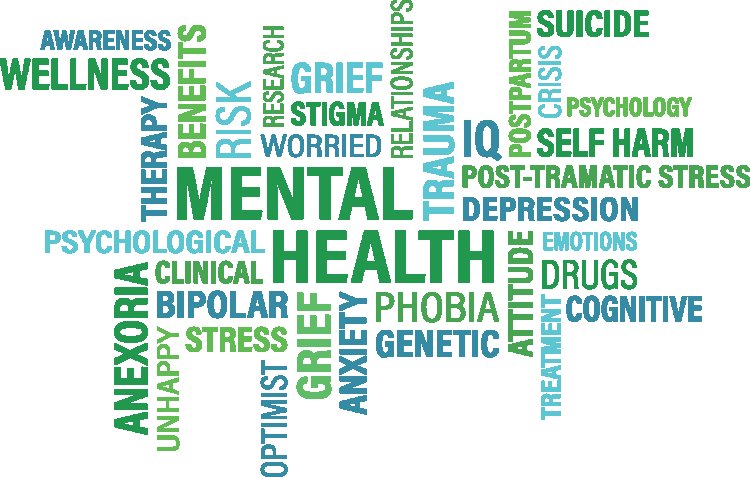Mental Health in the Digital Age: Challenges and Self-Care
Uncover the impact of the digital age on mental health and learn self-care strategies. Break stigma, prioritize well-being, and navigate the digital landscape with resilience.

Today's article will go into great detail on a topic that many of us may have been avoiding: mental health. In this fast-paced world when we are always surrounded by social media and other digital distractions, it's easy to forget our mental health, but it's time to put it first. How much time do you spend each day on your phone? The average youngster spends six to eight hours every day on their phone. Yet why? The response is that it facilitates social interaction, music enjoyment, and artistic expression. Numerous articles discuss the damaging effects of excessive "phone time", the mental damage caused by violent video games, and other topics. Numerous articles have been written regarding the negative effects of excessive "phone time", violent video games, and other factors. These individuals believe that the phones themselves are the problem. But the circumstances here are more complicated. Not just the phone, either. Social media is to blame. Teenagers have used social media to an extent of 90%.
As technology continues to advance and become an integral part of our daily lives, it has both positive and negative effects on our mental well-being. Here are some key points to consider:
-
Increased Connectivity:
Technology has revolutionized communication and information access, providing global connections and bridging geographical and cultural barriers. However, it also brings challenges, such as curated and idealized versions of others' lives, FOMO, and disconnection from the real world. To maintain a healthy relationship with technology and prevent negative impacts on mental health, it is essential to establish boundaries, prioritize face-to-face interactions, cultivate mindfulness, and seek alternative social support sources. Diversifying connections and focusing on quality interactions can foster a supportive social environment.
-
Online Harassment and Cyberbullying:
The digital age has brought new challenges, including harassment, cyberbullying, trolling, and hate speech. Cyberbullying, trolling, and hate speech are prevalent issues that can negatively impact mental well-being. To address these issues, individuals, communities, and platforms must take proactive measures. Individuals should be aware of their online actions and promote a culture of kindness, empathy, and respect. Community-level campaigns and education on responsible digital citizenship can help raise awareness and address cyberbullying. Online platforms should prioritize user safety and invest in robust moderation systems to identify and address harassment. By promoting kindness, respect, and empathy, we can create a safer and more inclusive online world.
-
Information Overload and Digital Fatigue:
Information overload and digital fatigue are prevalent issues in today's digital age, causing mental exhaustion and stress. The constant bombardment of data and notifications can lead to heightened stress, anxiety, and difficulty concentrating. To combat these issues, it's essential to manage screen time, establish digital breaks, practice mindfulness, and create a supportive environment. Encouraging open conversations and providing resources for stress management can help individuals regain control over their digital lives and prioritize their mental health.
-
Online Mental Health Resources:
Technology has revolutionized mental health care by providing online resources, mental health apps, and teletherapy options. These advancements offer convenience, accessibility, and increased reach to underserved populations. However, it is crucial to approach these resources with discernment and ensure they are evidence-based and regulated. Collaborations between mental health professionals, technology developers, and regulatory bodies are essential to ensuring ethical standards, data privacy, and reliable support. Critical thinking and informed decision-making are essential when using digital mental health resources.
-
Gaming and Internet Addiction:
Online gaming and internet addiction are prevalent issues that can lead to addiction and adverse effects on mental health. Gaming disorder is a persistent pattern of gaming behavior that dominates daily activities and life interests. Internet addiction disorder affects daily functioning, relationships, academic performance, and overall well-being. Recognizing signs of addiction is crucial for addressing issues. Mental health professionals offer support, guidance, and digital literacy education to promote healthy habits and balanced internet activities.
-
Privacy and Security Concerns:
The digital age has raised concerns about privacy and security, with platforms like social media and online shopping enabling easy sharing of personal information. However, these platforms also create opportunities for misuse and unauthorized access, leading to identity theft, financial fraud, and targeted advertising. To protect privacy and digital security, individuals should be proactive, adjust privacy settings, use strong passwords, and exercise caution when sharing sensitive information. Regularly updating software and antivirus programs and supporting organizations that prioritize user privacy and data protection can help mitigate risks. Taking proactive steps to safeguard personal information online is crucial for maintaining control and ensuring peace of mind in the digital age.
-
Digital Detox and Self-care:
In the digital age, it is essential to prioritize mental health and well-being. Regular digital detoxes, setting boundaries on technology use, and prioritizing self-care activities are crucial for maintaining good mental health. Engaging in offline hobbies, physical activities, and spending time in nature can help alleviate stress and promote well-being. Fostering meaningful relationships, setting boundaries on technology use, and prioritizing self-care activities can help maintain a healthy relationship with technology and promote a sense of personal empowerment. By being mindful of digital consumption and investing in mental health, individuals can navigate the digital age with resilience, fulfillment, and a sense of personal empowerment.
Social media's fluctuations We are all aware of the fact that social media is becoming a regular part of our lives. Although it's a terrific way to remain in touch with loved ones, find inspiration, and share life's joys, have you ever considered the detrimental effects it might have on our mental health, from continual comparison to the dread of missing out? How can we limit our use of social media, given that it might contribute to anxiety and depression? So, here are some recommendations for action: Establish a time restriction for using social media. Try to stick to it. Unfollow the accounts that give you bad vibes and have an impact on your mental health. Instead of depending on interactions on social media, make an effort to engage with people in person. the significance of self-care. Self-care is not being selfish; it's crucial to prioritize your mental health and set aside time for yourself to do things like read a book, go for a walk, or have a spa day. Self-care is essential for preserving a sound mental condition.
In today's digital age, it's easy to forget about self-care and get lost in our busy schedules. However, taking a break and indulging in self-care can boost our productivity and reduce stress and anxiety levels. Here are some self-care activities that you can try: Meditation and yoga journaling reading a good book, going out for a walk in nature, and finding a support system In today's fast-paced world, it's easy to get lost in our thoughts and feelings. That's why it's essential to have a support system—someone to talk to and share your feelings with. In the digital age, we have access to online support groups, hotlines, and mental health professionals that we can reach out to whenever we need help talking to friends, family, and our loved ones. Securing their support can also help. Here are some ways to build a support system: Join online support groups and forums. Talk to your friends and family about professional help and therapy. Sometimes all we need is a break from the digital world, a moment to disconnect and enjoy the present moment in today's world where we are constantly connected to our phones and laptops. Set a time limit for technology usage. Go for a digital detox and disconnect from social media and other digital distractions. Spend time in nature, enjoying the present moment. Let's finally talk about mental health.
Social media can be used for positive activities. It’s fantastic that teens have easy access to social interaction with their peers, especially during quarantine when they don’t have the option of going to school. However, statistics show that social media does more harm than good. On all social media sites, there’s an overwhelming urge to be popular and fit in. It’s human nature to seek approval from others. It’s human nature to want to belong. Social media apps use this to their advantage. The "like" button exists to seek approval from others. According to a study conducted by UCLA researchers, teens receive large amounts of dopamine whenever they see more likes on their pictures. It’s similar to eating chocolate or winning money. However, when teens receive fewer likes, they feel more strongly rejected and report more negative effects and negative thoughts about themselves.
Researchers at the University of Texas at Austin simulated student social media interactions. The study found that receiving fewer likes lowered the students’ self-esteem. A second study using the same experimental task found that teens with the strongest negative reaction to receiving fewer likes were also more likely to experience symptoms of depression. As well as that, the pressure to receive likes and be liked can lead to insecurity online. And a big part of that has to do with body image. Often, the most liked photos and most popular accounts are ones featuring attractive people, like celebrities like Selena Gomez or Kylie Jenner. If people like them because of their bodies, teens naturally want to look just like them. However, social media is flooded with unreasonable standards. In the digital age, it’s easier than ever to edit selfies using Photoshop or other apps. You can cover up blemishes, change your body shape, and more.
The prevalence of depression among teenagers aged 14 to 17 increased by more than 60% between 2009 and 2017. Suicidal plots, attempts, and thoughts have all risen sharply, sometimes by more than double. This trend cannot continue. the action must be taken. Exists a remedy, though? Banning social media could be the first thing that comes to mind. However, getting rid of it altogether isn’t the solution. As mentioned before, social media is a genuinely good tool for teens to connect, especially during the pandemic when there is no in-person school. But clearly, something does need to change. For example, Instagram is experimenting with removing likes from its posts. Users will still be able to like pictures, but the like count will be removed from public view. It’s too early to see if this is helpful to the mental health of users, but it’s fantastic to see companies attempting to solve this issue. The problem of unreasonable standards, however, is something more complex.
The root issue isn’t just perpetuated by social media. Before social media, TV magazines pushed unrealistic bodies as well. Body dissatisfaction is also brought on by this. As was already noted, this can have a variety of negative effects, such as low self-esteem, desperation, self-harm, and suicide. Did you know that more than 70% of those suffering from mental health problems do not receive any sort of care or treatment? In high school, about 20% of pupils had suicidal thoughts. Teenagers with depression are more than twice as likely to leave high school. The effects of this mental health crisis are serious.
Mental health in the digital age is complex and multifaceted. To maintain good mental health, it's essential to promote digital literacy, set boundaries, seek support, and prioritize self-care practices. Technology offers benefits but also presents challenges, such as social comparison, information overload, and addiction. By embracing technology, setting boundaries, seeking support, and prioritizing self-care, we can navigate the digital landscape with resilience and a healthier relationship with technology.
Let's talk about mental health. There is a stigma attached to mental health, and people still hesitate to talk about it openly. However, talking about mental health is essential to reduce the stigma and encourage people to seek help if they need it. So let's break the silence and start talking about mental health. Let's support each other and prioritize our mental health.
What's Your Reaction?








































































































